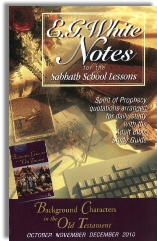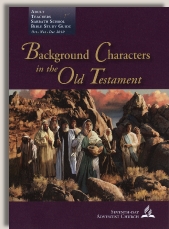|
||||||||||||||
Commentary on "The Widow of Zarephath: The Leap of Faith"
Day 5: Wednesday, December 8, 2010 - Remembering My Sins
Day 6: Thursday, December 9, 2010 - Testing Faith
Overview
“As we come into contact with a holy God, our sins become more apparent. And then, when something terrible happens, we may feel that the Lord is punishing us.” (Adult Teachers Sabbath School Bible Study Guide, Oct. Nov. Dec. 2010, page 132)
“We often face two kinds of ‘tests’ regarding faith. The first kind is the kind in which we really have no choice. Perhaps you go to the doctor and are given bad news. This isn’t a challenge you have chosen. It was thrust upon you.
In contrast, perhaps you are offered a dream job, the job you always wanted. Everything is all set until you hear the words, ‘You will have to work on some Saturdays.’
What are the differences in these scenarios, and what role does faith play in them both?” (Adult Teachers Sabbath School Bible Study Guide, Oct. Nov. Dec. 2010, pages 133, 135)
Problems
I’ve chosen to consider Wednesday’s and Thursday’s lesson together because they are bookends to the problems of indwelling sin and circumstances.
Wednesday’s lesson is completely consistent with Adventist theology. Because Jesus’ work was not finished in the Christ-Event, we cannot have assurance that our sins really are forgiven. This question from Page 133 of the "Teacher’s Quarterly" is a perfect example: “Can even forgiven sins be later realized in a clearer light?”
Because our sins are never really forgiven until the very end, when Satan bears them as our scapegoat (which, by definition, would make him our redeemer), we cannot have assurance of salvation.
These two facts of Adventist theology are diametrically opposed to the passages to which I referred in Tuesday’s lesson. As a result, if an Adventist cannot have either the assurance of forgiveness or salvation, then an Adventist cannot exercise faith as the Bible defines it.
The Bible’s definition of faith has as its foundation an infinitely powerful, loving and gracious God Who took the initiative to make salvation possible and offer it to us. The Adventist god is fickle at best, requiring perfect obedience to a Law that cannot be kept, and worse, requiring such performance in the absence of the Holy Spirit at the most crucial time in earth’s history.
No wonder Adventists must ask, “What I have I done to deserve this?” This question, which the widow also asked, demonstrates a fundamental misunderstanding of how God works. Whenever we humans insert ourselves in the salvation equation, guilt results. It must. We all know we have indwelling sin in our flesh, forever warring against the Spirit (see Galatians 5).
Ironically, the only solution to this question is faith, the reality of a guaranteed hope applied to this moment of failure. If you have not settled the issue of sin and death once and for all, you always will be constrained to doubt.
In Thursday’s lesson Elijah faces his doubts. He seems to have been wired this way. After every great victory Elijah fell into the trap of unrealistic expectations and misplaced dependencies, and predictably experienced depression.
In every case, God reminded him that doubts are a normal part of life, but that faith can overcome those doubts. The key to overcoming is putting faith in God, the infinitely powerful, loving Object, rather than focusing on self and circumstances.
There simply is not one shred of evidence in the story reported in 1 Kings 17 that the boy’s illness and death was either the result of the widow’s sin or God testing Elijah’s and the widow’s faith. It simply happened. Both Elijah and the widow reacted predictably – Elijah with doubt, the widow with fear. And then Elijah took his request to God (see Philippians 4:6-7).
Finally, a brief comment regarding Scenario #2 quoted above. Everything in the Adventist belief system is based on works. A person cannot take a “dream job” because it might require weekend work. How else can this be interpreted except that 1) God will punish you somehow for not observing the Fourth Commandment, or 2) even if God doesn’t punish you today, you undoubtedly will be lost at the end of time because you failed to keep the Fourth Commandment?
What does this belief have to do with faith? Nothing! It is the opposite of faith. Here’s the logic: If I don’t work on Sabbath, God will bless me. Notice that my “observance” of the Law puts God in my debt. This is arrogant unbelief at its worst.
Again, Adventists don’t have a monopoly on this line of thinking. I’ve seen and heard it in nearly every denomination. Every one of them has their hobby horses. If a member fails to bow down properly to a hobby horse, God is loosed upon them. Here’s the kicker. If a member honestly believes he has properly observed the hobby horse and DOES NOT receive the expected blessing then he is left with only one conclusion – he failed God after all.
In all cases, faith is inoperative because there is a fundamental misunderstanding of salvation.
Summary
- The lesson’s author properly brings up the issues of indwelling sin and doubt as normal reactions to tragedy.
- Adventist theology completely misses the mark in regards to dealing with indwelling sin and doubt. Therefore, Adventists are left with only one option – try harder.
- Faith, Jesus’ complete victory (our hope) applied to the current situation, is the proper response to tragedy and to the reactions so common to it. Elijah displayed it. The widow learned it.
Copyright 2010 BibleStudiesForAdventists.com. All rights reserved. November 15, 2010. This website is published by Life Assurance Ministries, Glendale, Arizona, USA, the publisher of Proclamation! Magazine. Contact email: BibleStudiesForAdventists@gmail.com.
The Sabbath School Bible Study Guide and the corresponding E.G. White Notes are published by Pacific Press Publishing Association, which is owned and operated by the Seventh-day Adventist church. The current quarter's editions are pictured above.
Official Adventist Resources
Standard Edition Study Guide Week 11
Teacher's Edition Study Guide Week 11
Easy Reading Edition Study Guide Wk 11
Search the Complete Published Ellen G. White Writings


